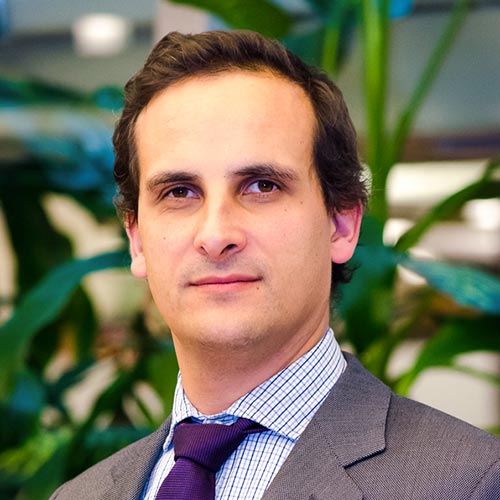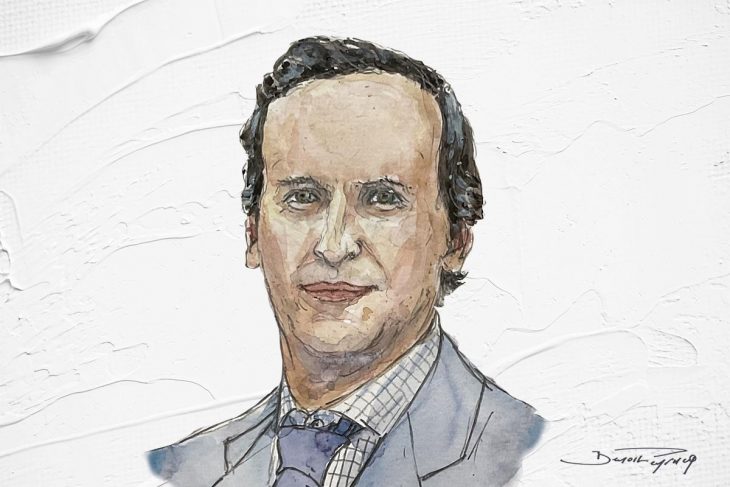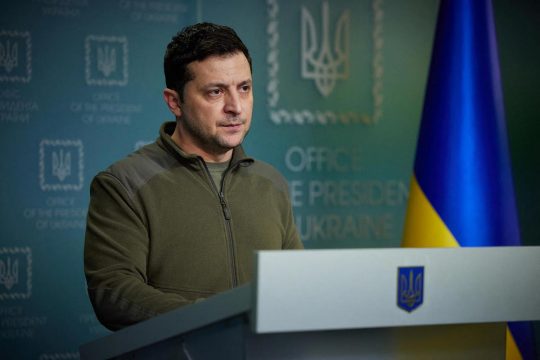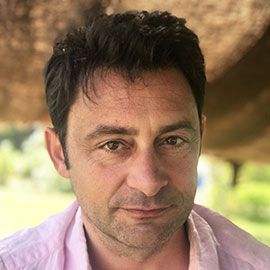JUSTICE INFO IN-DEPTH INTERVIEWS
Frédéric Mégret
Professor and co-director of the William Dawson Chair in Human Rights and Legal Pluralism
One year after Russia's invasion of Ukraine, its leaders remain largely immune from international justice, while Kyiv continues to make use of the legal ammunition at its disposal. Its “lawfare” goes hand in hand with unprecedented efforts by the international community to respond to the aggression and allegations of war crimes in ways that are sometimes innovative and cause "stress" for lawyers, says Frédéric Mégret, co-director of the Centre for Human Rights and Legal Pluralism at the Law faculty of McGill University in Canada.
JUSTICE INFO: A few days after the start of the Russian Federation’s invasion of Ukraine on February 24, 2022, we asked ourselves the question "Can justice come to Ukraine's rescue?” One year later, what can we say?
FRÉDÉRIC MÉGRET: One thing can be said: justice is a bit slow. This is not entirely surprising, even if legal experts don’t often say so, since the fate of justice in Ukraine is partly dependent on the outcome of the fighting. A Ukrainian victory would greatly increase hopes for justice. A Russian victory would be catastrophic. And a peace agreement could have an ambiguous effect on the continuity of these justice efforts.
Among Ukraine's Western backers there is a certain wait-and-see attitude and ongoing assessment of the consequences that more “lawfare” might have on the political and military dynamics of the conflict."
One senses that this is not happening very quickly because, in particular, among Ukraine's Western backers there is a certain wait-and-see attitude and ongoing assessment of the consequences that more “lawfare” might have on the political and military dynamics of the conflict. To put it plainly, if the West puts all its efforts behind the creation of an ad hoc criminal tribunal to try [Russian President] Vladimir Putin for the crime of aggression, it also puts itself in a situation where it becomes very difficult to have conversations with the Russian leadership. We know that these conversations are still taking place a bit, and that they may have reason to take place in the future. So I think there is a bit of caution, which is drowned out by technical debates, the whole thing being in any case linked to the availability of defendants, which is very far from being guaranteed. Because even if we were to go quickly and create a beautiful new judicial institution, we could spend years in a virtual state, waiting for the accused, like the Special Tribunal for Lebanon.
That said, some things have been done, because Ukraine took the initiative. The first is that there have been prosecutions by the Ukrainians themselves for war crimes. Even if this is largely symbolic, it is not nothing. Secondly, the cases before the European Court of Human Rights (ECHR) and the International Court of Justice (ICJ) are proceeding, albeit slowly. In the case of the ECHR, though, Russia's withdrawal from the Council of Europe [on March 16, 2022] does not bode well for what these cases could accomplish.
The only courts that are actually conducting trials are Ukrainian. Did it surprise you that trials were held so soon in a country at war?
No. I think that when it comes to "ordinary" war crimes, we are dealing with the proper functioning of national justice, whose objective is to react quickly and continuously to violations. There may be some hesitation regarding the qualification of crimes, and we feel that some Ukrainian judges or prosecutors are struggling a little in this exercise, but we have had trials that reflect a functioning of justice that may not be perfect but is correct. Their only real weakness is that they only concern minor executors.
Isn't the outcome of the fighting and, in particular, the exchange of prisoners what hampers the trials of senior military officers in Ukrainian courts?
Yes, but the issue of prisoner exchanges should only concern those who are not accused of war crimes. Many have simply been involved in combat in accordance with the law of armed conflict. Russians who were captured with weapons in their hands are prisoners of war and should not be tried. That is the principle. Is the fact that they are being exchanged because they are officers, or because the evidence and cases are more difficult to build in these particular cases? We don't really know. When you see the Ukrainians’ rhetoric and willingness to point the finger at Russian abuses, I would be really surprised if they had a senior officer in their custody against whom they had credible evidence and they thought their interests better served by exchanging this individual rather than trying him.
On the Russian side, we had the example of the Ukrainian fighters of the Azov battalion taken prisoner by the Russians, whom Moscow announced it wanted to try in Mariupol but who were finally exchanged...
The Russians, a priori, did not have any credible accusation to hold against these soldiers, who fought between combatants, which is entirely part of the law of war. What the Russians said was that they were going to try them for terrorism, for offences that do not fall under international humanitarian law. This played a propaganda role, to say that the Azov battalion is composed of extremists, fascists. The international community loses nothing by this exchange of prisoners, even if, in fact, Russia had the obligation, not just the ability, to try soldiers it captured that committed war crimes. The Geneva Conventions are very clear on this. But in this case, we are still waiting for proof.
Since the beginning of this war, Russia has withdrawn completely from the judicial field. Is this a strategy that is bearing fruit?
They are completely withdrawing from this field, yes. We saw this very early on when they did not even appear before the ICJ to support their arguments. We are in a situation where Russia is reaping the fruits of a long-term strategy of protecting itself from the jurisdiction of international courts. It has not recognized the compulsory jurisdiction [agreement given in advance that makes referral to the ICJ automatic] of the ICJ, for example, which has obliged Ukraine, in a rather paradoxical manner, to try to engage Russia's responsibility for its aggression through the Genocide Convention, which contains an arbitration clause [that makes referral to the ICJ compulsory].
And of course, Russia's veto power in the UN Security Council blocks any possibility of creating an ad hoc tribunal or referring the situation to the International Criminal Court (ICC). From this point of view, the cards are pretty much dealt in Russia’s favour. The great strength of Ukraine is that it has recognized the jurisdiction of the ICC on its territory since 2014. This cannot be taken away from it. Ukraine has the right to transfer jurisdiction to the ICC over genocide, crimes against humanity and war crimes. Russia is not immune from a UN General Assembly resolution condemning it, but it is largely immune from international justice, and it has always understood that. There is no surprise.
The Russians are not in a logic of turning their backs entirely on international law, they are in a logic of having a quite particular and fantasist interpretation of it."
Is this a denial of international law on the part of Moscow?
It is the policy of the empty chair. The irony, of course, is that the Soviet Union was one of the organizing powers of the Nuremberg Tribunal [in 1945]. But, like many great powers, no one really believed that it would then voluntarily submit to international justice. Does this strategy work? In concrete terms, it is a strategy of avoidance that is not very complicated to implement, since the international system is still largely based on the will of states.
Russia is not entirely a revisionist power that would make a mockery of international law. What is quite interesting, listening to the statements of the Russian leaders, is that there is a constant reactivation of the memory of Nuremberg and a justification for the invasion of Ukraine by an alleged commission of genocide by Ukraine against the Russian minority. So the Russians are not in a logic of turning their backs entirely on international law, they are in a logic of having a quite particular and fantasist interpretation of it.
One can also say the Russians rely on gaps and contradictions in international law and the West’s rather cavalier use of force in the past, notably the 2003 invasion of Iraq, but also the bombing of Serbia in 1999 and Libya in 2011. In the latter case, China and Russia felt they had been duped into supporting a Security Council resolution that was interpreted by the West as authorizing them to bomb Libya. We're paying the price for some of those mistakes. But it is interesting that Russia feels compelled to justify its aggression in terms of international law, even if its argument is biased.
The nature of the fighting at the moment is not such that there is room for really serious accusations of war crimes by Ukrainians.
Aren't we once again in a situation where international justice is likely to be perceived as a judicial tool of the West, and as unfair?
There are several dimensions to this. There is a dimension of fairness between Russia and Ukraine, and a dimension of fairness between the attention given to Ukraine and to other situations. On the first question, we are well aware that the armed conflict is taking place on the territory of Ukraine. There are no Russian civilians against whom the Ukrainians could commit war crimes, and the nature of the fighting at the moment is not such that there is room for really serious accusations of war crimes by Ukrainians. We must not forget that there is a threshold, especially in the Rome Statute [and therefore for the ICC]: these crimes must be the result of a policy and they must be widespread. It is Russia that is committing all the crimes on Ukrainian territory and not the other way around.
I don’t have the impression that the ICC Prosecutor is indulging in gratuitous political statements that would call into question his neutrality. And then you have to know what you want: for 20 years, we deplored the fact that the ICC focused on African defendants. Now, we can congratulate ourselves on the fact that it is diversifying international criminal action. In practice, does this serve the Western and Ukrainian strategy? Absolutely. But this is not the problem of the Prosecutor, as long as he conducts his investigations independently. The idea that he should investigate a case [against Ukrainians] to show that he is fair would, in my opinion, be to enter into a false logic of trying to be fair.
Would you say that this whole year has been a practical exercise in "lawfare", in war through law, on the part of Ukraine?
I still feel ambivalent about this concept, because in the United States and in Israel it has often been used to denigrate parties to armed conflicts who are accused of claiming they have been victims of violations of the law of war and using this law to their advantage. I have no problem with this, I am not naive: everyone manipulates the law, rhetorically at least, to gain some advantage. But here, the Ukrainians are firing on all cylinders with the little ammunition they have legally and they are not inventing anything. They are not putting their civilians in vulnerable situations a priori in order to accuse the Russians of committing crimes. They do not put themselves in ambiguous situations where, for example, they would put hospitals near military installations to protect their equipment. This is not Hamas. Ukraine is a state that respects the law, and when the law is violated against it, it is the first to say so. This is not lawfare. It is law. It's applying the law. If I sue someone because they violated my rights, that's not an abuse of process, that's just completely normal.
Ukraine, however, in seeking to fill the blind spot of the crime of aggression, leaves nothing to chance...
Of course, the Ukrainians have good lawyers, they are perfectly integrated into international law and one cannot really blame them. But we cannot reinvent international law. As for the aggression tribunal, I would say that Ukraine is still cautious. It is not very clear whether it is more in favour of a revision of the Rome Statute, the creation of a special court or a hybrid court. Ukraine realizes that an international judicial solution involves other states and that, therefore, there is no point in taking a strong stand for one of these options without knowing what consensus will emerge among the main states involved at the international level. There is an aggressive, dynamic judicial strategy, but there is also a certain wait-and-see attitude, if only because not everything is in the hands of Ukraine. What the ICC Prosecutor does is not in Ukraine's hands, the creation of an international court for aggression is not in Ukraine's hands. There are limits to what it can do.
Today, the creation of this tribunal still seems to be dependent on a draft resolution before the UN General Assembly. What do you think of this option?
It has been talked about for some time, but it does seem that this unprecedented direction is being taken. The ad hoc international tribunals for Rwanda and former Yugoslavia were created by the UN Security Council. This power of the General Assembly exists, but we will have to see how it is implemented, if at all, and whether it will calm all the concerns of the legal community. In my opinion, this tribunal will not have any enforceable power against Russia. And so the issue of immunities would remain largely untouched.
The immunity of state officials has never been considered historically, either at Nuremberg or by contemporary international tribunals...
Yes, but you have to see that Nuremberg was created by an occupying force, and that the tribunals for Rwanda and the former Yugoslavia were created by the Security Council on behalf of all nations. So if two states got together and created an international tribunal, could they try the sitting head of a third state and say "this is an international tribunal so there is no immunity"? This is not a blocking point, but it is a point of stress, of anxiety for international lawyers. If we say that Putin has no immunity before a tribunal created by the West, tomorrow some states in the South, for example, will say: we too can create an international tribunal that is not obliged to respect the immunities of the American or French president. In international law, one must be prepared to live with the rules that one claims to impose on others. Beyond the technical question, there is also the political question of knowing if we want to create a precedent where an international tribunal can be created between a group of states, without a Security Council resolution and without universality, and impose it de facto.
There is a need, for the Ukrainian population, not to promise something that is completely improbable. Creating a court and not being able to get the suspects arrested is not very interesting."
Is this not the only possibility for this crime to be judged, in the Ukrainian context?
There would be another possibility, that of prosecuting the aggression as a form of crime against humanity in the broad sense. There would be no doubt that the ICC has jurisdiction. Aggression as a whole is also a generalized or systematic attack against the civilian population. It is an idea that has been circulating for the last 20 years to judge aggression through crimes against humanity. This option would have the advantage that it would not require reinventing the wheel, that there would be no need for a new tribunal. But we are, as is often the case in the international system, in a difficult situation where all solutions have drawbacks. And there is a need, for the Ukrainian population, not to promise something that is completely improbable. Creating a court and not being able to get the suspects arrested is not very interesting.
Between an ineffective tribunal and no tribunal at all, I think that the international community will opt for an ineffective tribunal."
In your opinion, will this tribunal finally exist?
I find that in recent months states have been keeping their cards remarkably close to their chest. Everyone wants to be seen as supporting Ukraine and, at the same time, not creating things that are unlikely to work. But I think that in the end, this tribunal will be created because, at some point, something has to be done, there is a symbolic stake and, in the end, between an ineffective tribunal and no tribunal at all, I think that the international community will opt for an ineffective tribunal.
With the aggression, it is not only Putin and Lavrov [his foreign minister] who are targeted, but a few hundred individuals at the highest level of the state, who are in a position where they can control the aggression and are involved in decisions concerning it. It is the value and centrality of the norm against aggression that is at stake. If the international community is perceived to be soft on aggression, it would also be a sign to others who might be tempted to follow the same path as Russia. This is a long-term job.
Isn't it a bit like the fate of Ukraine to have entered both the long perspective of war and the long perspective of justice?
Yes, the perspective is very long. We know that no Russian is going to stop committing acts of aggression or even war crimes just because the ICC or a special court is seized. So we are laying the foundations for something longer term.
The problem is that the creation of ad hoc jurisdictions to judge a crime committed by a country certainly remedies the blockage of the international legal system, but also pays the price of its selectivity and of continuing to make international justice seem like a kind of constant political tinkering, reflecting the will of coalitions of states that do not represent the entire international community. The whole trajectory of international criminal justice over the past 30 years has been to say that we need to move away from the Nuremberg precedent, which was fundamentally victors’ justice. In 1998, with the adoption of the Rome Statute [which created the ICC], there was this hope of a universal court that pre-exists the crime and is based on the sovereignty of states. But Russia, like others, never became a party to the Rome Statute and a band aid is being sought to make up for the ICC's deficiencies.
There is a danger of discrediting the ICC, considering that it is a court that serves us until it does not serve us in this or that conflict, and then we say in this case it is not serious, we will create a new court that will allow us to achieve our objectives. But maybe it is not serious, maybe it is just the right thing to do. Maybe that is the right division of labour: the ICC is there for a good part of the crimes and then, from time to time, we must be ready to put a patch on it.
There is a lot of cynicism on the Russian side, but they try to drape their actions in the language of law."
In recent months, Russia also seems to be more and more unconcerned that it is attacking civilian targets...
Yes, completely. But we must recognize one thing: there is a front line. We attack civilian infrastructure but the Russians say it is because the Ukrainian army needs electricity. It is true that Putin had one or two statements where he said in substance "you want to beat us on the battlefield, your civilians will pay the price". At the same time, there is a form of restraint. It's not the Battle of London [by Nazi Germany in 1940], it's not [the 1945 Allied bombing of] Dresden, there are no such massive bombings. Kyiv or cities that are far from the front have not been bombed massively. Yes, electricity installations have been bombed, and missiles fell on civilian targets either on purpose or because they deviated from their trajectory. But we are in a kind of in-between. There is a lot of cynicism on the Russian side, but they try to drape their actions in the language of law. And on dual-use targets, it’s an old debate that took place with Kosovo and Iraq.
Today, all cyber space is shared between the civilian and the military, this is also true of roads and bridges, of all kinds of infrastructure. It is difficult to determine whether they have an exclusively civilian vocation. This is often not the case.
For the ICC, the choice is always going to be that if they have relatively clear cases where civilians have been targeted directly, they will prioritize those cases because it's going to be much easier to prove guilt than when mixed targets have been hit. Of course, if you have a commander or a political leader who has the stupidity to say "we are doing this to terrorize civilians", then it is indeed much easier to envisage a trial.
We are in an almost genocidal logic."
What do you find the most characteristic thing about justice in Ukraine?
Knowing what, finally, is the most serious crime today. Is it aggression? Is it the way in which the war is being committed, and therefore war crimes? Is it an accusation of crimes against humanity, when it comes to Ukrainian civilians and the destruction of infrastructure? We must realize that for most people in Ukraine today of course there is the violation of their sovereignty, but there is also the fact of infamous and cowardly attacks on civilians on a large scale. One gets the impression that there is a real desire to deny the existence of the Ukrainian people as such and that, in the end, the armed conflict is just a means to attack a civilian population, to subjugate it, to exterminate it in some cases. Yes, of course, it looks like a classic war, one state attacking another. But if we look at the "big picture", can't we begin to wonder about the deeper meaning of the Russian plan in Ukraine? We are in an almost genocidal logic, potentially. The future will tell.
Interviewed by Franck Petit

Frédéric Mégret is a professor and co-director of the William Dawson Chair in Human Rights and Legal Pluralism at McGill University in Canada. He is a specialist on international criminal justice, international humanitarian law, international organizations and transitional justice.








